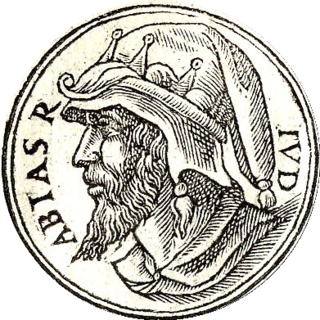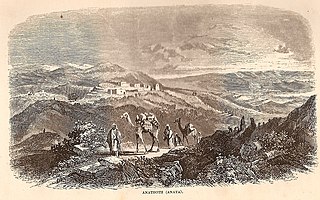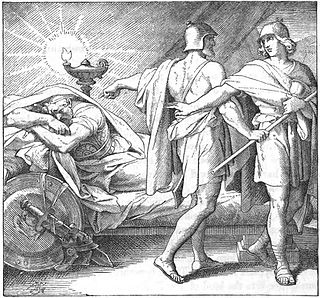External links
![]() This article incorporates text from a publication now in the public domain : Easton, Matthew George (1897). Easton's Bible Dictionary (New and revised ed.). T. Nelson and Sons.Missing or empty
This article incorporates text from a publication now in the public domain : Easton, Matthew George (1897). Easton's Bible Dictionary (New and revised ed.). T. Nelson and Sons.Missing or empty |title= (help)
Abishur (Father of the wall; i.e., "mason") is one of the two sons of Shammai of the Tribe of Judah (1 Chronicles 2:28-29).
![]() This article incorporates text from a publication now in the public domain : Easton, Matthew George (1897). Easton's Bible Dictionary (New and revised ed.). T. Nelson and Sons.Missing or empty
This article incorporates text from a publication now in the public domain : Easton, Matthew George (1897). Easton's Bible Dictionary (New and revised ed.). T. Nelson and Sons.Missing or empty |title= (help)
Abijah is a Biblical Hebrew unisex name which means "my Father is Yah". The Hebrew form Aviyahu also occurs in the Bible.
Zephaniah is the name of several people in the Hebrew Bible and Jewish Tanakh; the most prominent one being the prophet who prophesied in the days of Josiah, king of Judah and is attributed a book bearing his name among the Twelve Minor Prophets. His name is commonly transliterated Sophonias in Bibles translated from the Vulgate or Septuagint. The name might mean "Yah has concealed", "[he whom] Yah has hidden", or "Yah lies in wait".

Abijam was, according to the Hebrew Bible, the fourth king of the House of David and the second of the Kingdom of Judah. He was the son of Rehoboam and the grandson of Solomon. The Books of Chronicles refers to him as Abijah.
Ahijah is a name of several biblical individuals:
Ahio - brotherly.
This article incorporates text from a publication now in the public domain: Easton, Matthew George (1897). Easton's Bible Dictionary. T. Nelson and Sons.

Anathoth is the name of one of the Levitical cities given to "the children of Aaron" in the tribe of Benjamin. Residents were called Antothites or Anetothites.
Aner refers, in the Hebrew Bible, to:

The Illustrated Bible Dictionary, better known as Easton's Bible Dictionary, is a reference work on topics related to the Christian Bible, compiled by Matthew George Easton. The first edition was published in 1893, and a revised edition was published the following year. The most popular edition, however, was the third, published by Thomas Nelson in 1897, three years after Easton's death. The last contains nearly 4,000 entries relating to the Bible. Many of the entries in Easton's are encyclopedic in nature, although there are also short dictionary-type entries.
Uzzi is a given name. One derivation is biblical, from Uzzî meaning "my strength". The name can also be transliterated as Uzi. It may be a nickname for Uzza/Uzzah, Uzzia/Uzziah, and Uziel/Uzziel.
Ramoth-Gilead, was a Levitical city and city of refuge east of the Jordan River in the Hebrew Bible, also called "Ramoth in Gilead" or "Ramoth Galaad" in the Douay–Rheims Bible. It was located in the tribal territorial allotment of the tribe of Gad.
Ophrah, is a name in the Hebrew Bible meaning "a fawn" given to:
Nethaneel - נתנאל "Gift of/is God", Standard Hebrew Nətanʾel, Tiberian Hebrew Nəṯanʾēl, also Nethanel:

According to the Books of Samuel of the Tanakh, Mephibosheth was the son of Jonathan, grandson of Saul and father of Micah. The Hebrew name is מְפִיבֹשֶׁת Məfīḇōšeṯ, meaning "from the mouth of shame", or Merib-baal. 1 Chron 8:34 and 1 Chron 9:40 state his name as Merib-baal, and his son as Micah.
Hadadezer, son of Rehob, was king of Zobah, a Syrian (Aramaean) kingdom that may have been in the Beqaa valley of Lebanon, extended along the eastern side of the Anti-Lebanon Mountains reaching Hamath to the north. The kingdom of Zobah exercised power throughout southern Syria, and inevitably clashed with the expanding empire of Israel.

Abishai was the eldest son of Zeruiah, sister of the biblical King David. The meaning of his name is "Father of a gift". He was the brother of Joab and Asahel, and a military leader under David.
Isaiah 20 is the twentieth chapter of the Book of Isaiah in the Hebrew Bible or the Old Testament of the Christian Bible. This book contains the prophecies attributed to the prophet Isaiah.
Ahitub was a High Priests of Israel cited in the Bible.